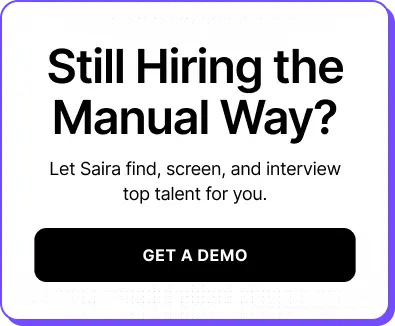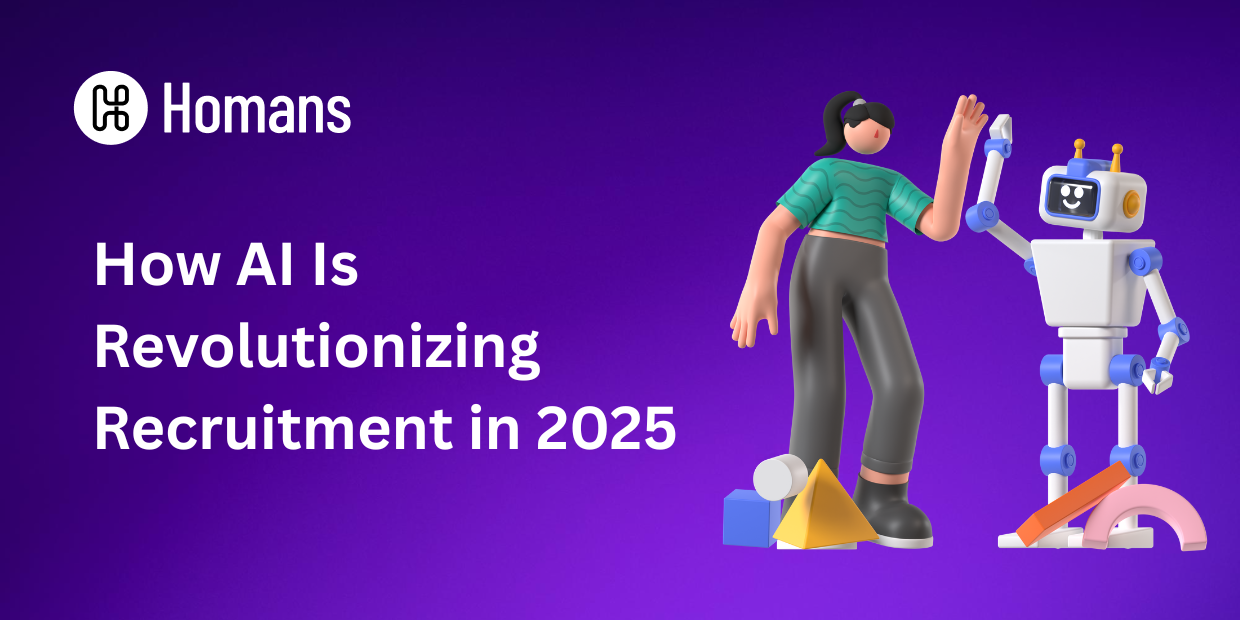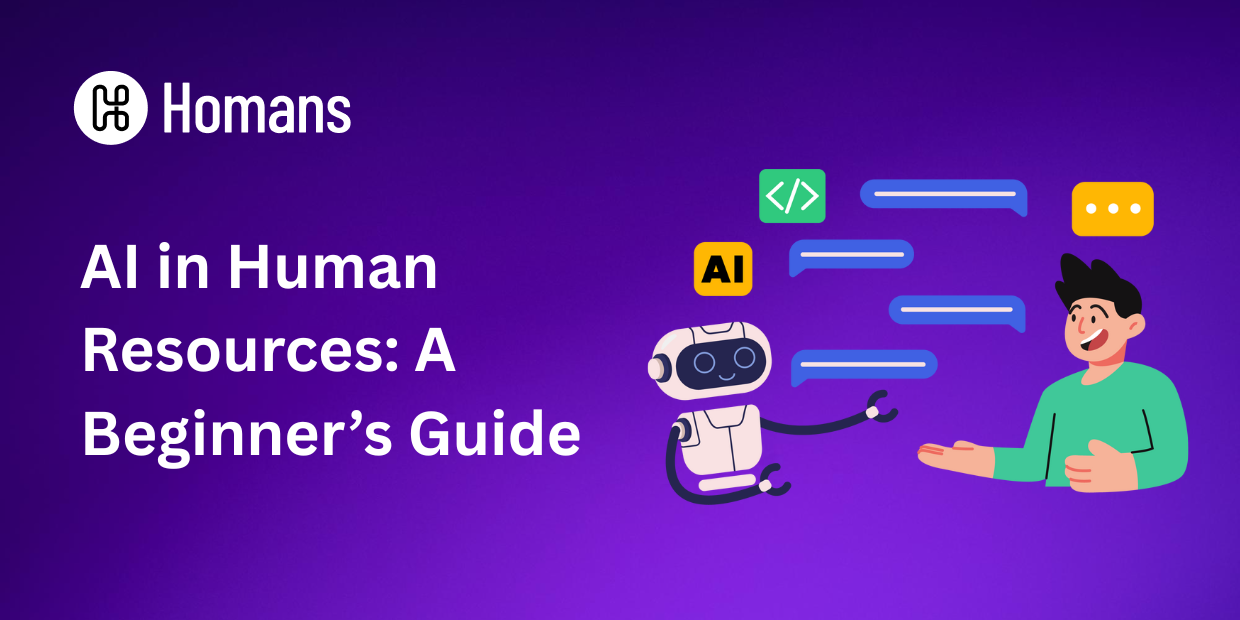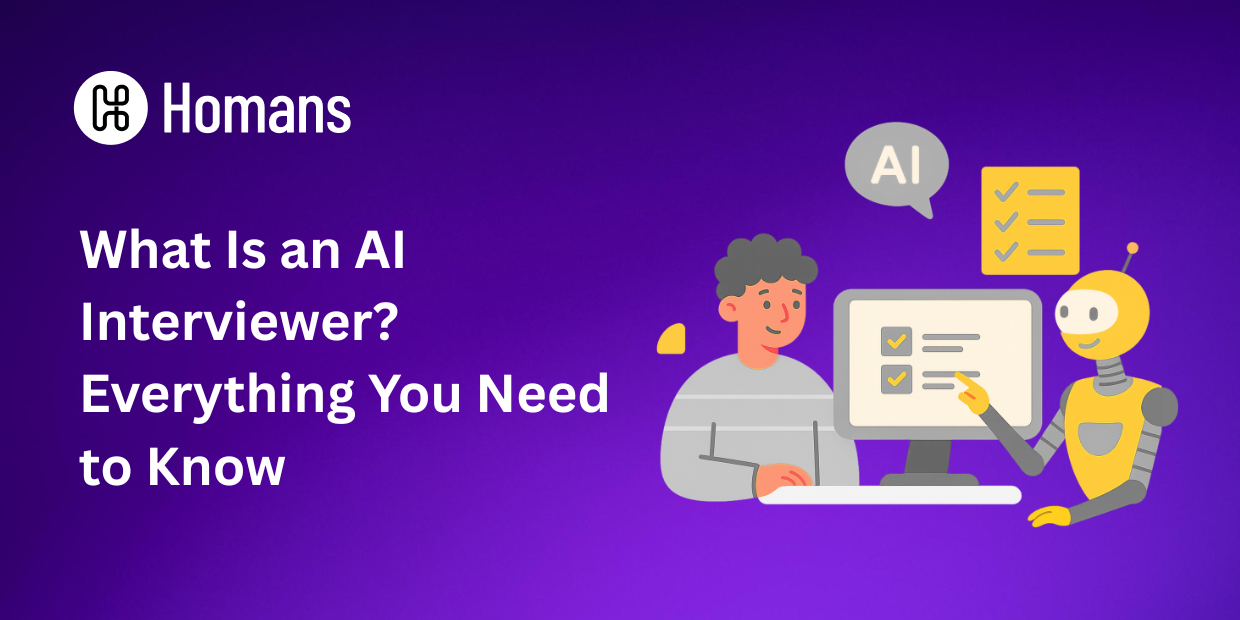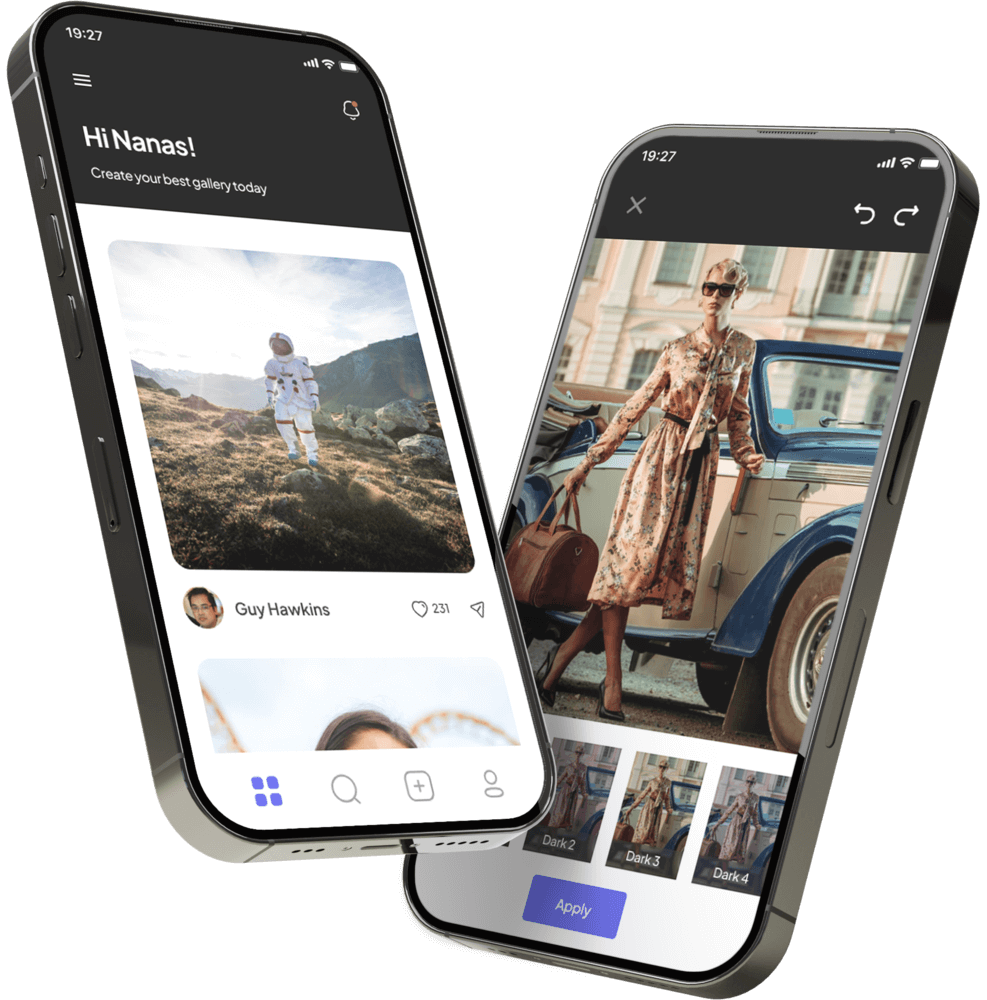Introduction
Artificial intelligence (AI) is making big changes to the way people hire. As we move through 2026, AI Is Revolutionizing the way companies find and hire talent. In fact, 87% of companies now use AI to make their hiring processes easier.
This technological revolution is changing the way companies find, attract, and hire people, making the process more efficient, objective, and strategic than ever before. According to estimates, the global market for AI recruitment will be worth $5.4 billion by 2030, growing at a CAGR of 17.9% from 2024. This blog post looks at how AI is changing the way companies hire people in 2026. It talks about important trends, benefits, challenges, and best practices for companies that want to use AI to help them find new employees.
TL;DR (2025–2026)
- AI speeds up hiring by 30–75% (depending on workflow)
- Best results come from hybrid hiring: AI for screening + humans for decisions
- Biggest risks: bias, privacy, compliance, candidate experience
- Start with: resume screening + chatbot + scheduling, then expand
Trends in AI hiring in 2026
Recruiting with AI and agents
As companies start using more advanced AI tools to find and hire new employees, their abilities and options are growing. This could lead to a future where AI agents could handle the hiring process on their own with little help from people. As Generative AI (GenAI) continues to improve and agentic AI capabilities become more common, the way talent acquisition teams work across industries is changing and the way they hire is changing.
Unilever used AI-powered video interviews and predictive analytics to cut the time it takes to hire by 75% while processing more than 250,000 applications each year. Their AI solution helped their hiring team save more than 100,000 hours a year and make teams that were more diverse.
Changes in Hiring Based on Skills
AI is speeding up the shift to skills-based hiring, which means that candidates are judged on their skills and abilities instead of their education or job titles. Nace Job Outlook 2024 says that less than 40% of employers use educational qualifications as a main screening factor. This shows how much hiring has changed away from focusing on academics.
For example, IBM changed how they hire people by using AI-powered skills tests. This led to a 30% increase in employee retention and a 50% decrease in the time it takes for new hires to become productive. Their AI system finds the best fit for a job by looking at more than 10,000 different skills combinations.
Hyper-Personalization on a Large Scale
The next step in AI recruiting is to make sure that each candidate has a unique experience while still being able to hire quickly. This includes application processes that change based on a candidate’s background and preferences, personalized content delivery based on their career interests, and custom assessment pathways that focus on skills and experiences that are relevant.
In the real world, L’Oréal used AI chatbots to tailor candidate interactions to their backgrounds. This led to a 600% increase in interview completions and a 35% increase in candidate satisfaction scores.
Using Predictive Analytics for Workforce Planning
AI systems can use data to help make better hiring decisions by predicting which candidates are most likely to do well in certain roles or company cultures, finding retention risk factors during the hiring process, and more. Experts in the field say that by 2030, AI will be able to handle up to 75% of hiring tasks.
In the real world, Brother International Corporation saw a 140% rise in completed applications and a 25% drop in the time it took to fill positions after using AI-powered talent analytics that automatically optimize apply options for candidates.
AI that is ethical and open
As AI is used more and more in hiring, there is a growing focus on ethics and openness. AI systems that help people find jobs should be open and honest about how they choose and match candidates. To stop systemic discrimination and make sure that all candidates have equal chances, organizations are using continuous auditing and improving algorithms.
AI Recruitment Tools Used in 2026
Here’s a comprehensive overview of the most effective AI recruitment tools being deployed in 2026:
| AI Recruitment Tool | Primary Use Case | Key Benefit | Example Platform |
|---|---|---|---|
| AI Video Interviewers | Initial screening & assessment | Faster shortlisting – reduces screening time by 75% | HireVue, Spark Hire |
| Resume Screening AI | Automated candidate sourcing | Bias reduction – 50% decrease in unconscious bias | Ideal, Pymetrics |
| AI Chatbots | Candidate engagement & FAQs | 24/7 engagement – handles 10,000+ queries simultaneously | Mya, Olivia by Paradox |
| Predictive Analytics | Quality of hire prediction | 67% improvement in talent matching accuracy | Eightfold.ai, Phenom |
| Skills Assessment AI | Technical & soft skills evaluation | Data-driven insights – 40% increase in hiring accuracy | Vervoe, Codility |
| AI Job Description Writers | Content creation & optimization | 30% increase in qualified applicants | Textio, Ongig |
| Candidate Matching AI | Automated talent matching | 50% reduction in time-to-hire | SeekOut, Findem |
| AI Interview Schedulers | Calendar coordination | 90% time savings on scheduling tasks | Calendly AI, x.ai |
Breakdowns of the tools in detail:
HireVue (AI Video Interviewer)
- Looks at more than 25,000 data points for each interview.
- 58% of Fortune 500 companies use it
- On average, it cuts the time it takes to hire someone from 6 weeks to 2 weeks.
Perfect (AI for Resume Screening)
- Checks 1,000 resumes in less than 5 minutes
- 99% of the time, it finds qualified candidates.
- Removes up to 23 hours of manual resume review for each hire
Mya, the AI Chatbot
- Answers 75% of candidate questions without any help from a person
- Available in more than 15 languages
- Increases the number of candidates who respond by 95%
Advantages of AI for HR Teams in Hiring
Time and money savings
One of the best things about AI in hiring is that it can automate tasks that take a lot of time and effort. Deloitte’s research shows that AI can help recruiters save up to 23 hours per hire by screening resumes and interviewing candidates. AI cuts the time it takes to hire someone by an average of 50%, which lets recruitment teams focus on strategic initiatives instead of administrative tasks.
Quantified Effect:
- Before AI: An average recruiter looks at 50 applications a day.
- After AI: The same recruiter looks at more than 500 applications a day.
- The result is a tenfold increase in productivity.
Cutting Costs
Hiring tools that use AI can cut hiring costs by as much as 30%. Companies can save a lot of money and hire better people by automating repetitive tasks and making the hiring process easier. A recent study found that 93% of businesses that use AI save money, and 60% see their sales go up by 10% or more.
Breakdown of costs:
- Without AI, the average cost of hiring someone is $4,700.
- Average cost of hiring with AI: $3,290
- For 100 hires, the company saves $141,000 a year.
Better Experience for Candidates
AI makes the hiring process better for candidates by allowing for personalized interactions, quick responses, and open communication at all times. AI-powered chatbots answer candidate questions and give them updates on the status of their applications right away. This makes candidates feel valued and well-informed.
Metrics for Candidate Satisfaction:
- 82% of candidates would rather get quick answers from chatbots than wait for human recruiters.
- AI-powered forms have made it 68% easier for people to finish their applications.
- Candidate NPS (Net Promoter Score) went up by 45%.
Less bias and more diversity
AI could help make hiring less biased by focusing on things like skills and experience instead of demographic factors. By 2026, AI-powered hiring tools are expected to cut hiring bias in half. For example, Unilever’s hiring of diverse candidates went up by 16% after they started using AI interviews.
Effect on Diversity:
- Companies that use AI say they have 25% more diverse pools of candidates.
- Blind resume screening cuts down on gender bias by 54%.
- AI-powered tests boost the hiring of underrepresented minorities by 35%.
Making decisions based on data
AI helps recruiters make better hiring decisions by giving them data instead of just going with their gut. AI-driven interview analytics make hiring 40% more accurate, and predictive analytics make matching talent 67% better. This data-driven method helps find better matches between candidates and jobs, which boosts employee performance, satisfaction, and retention.
Results of Performance:
- Retention rates after 90 days go up from 65% to 87%.
- Ratings for first-year performance go up by 28%.
- 31% more employees are engaged.
Scalability for Large-Scale Hiring
AI recruitment tools are great for big hiring campaigns because they can handle thousands of applications at once without lowering the quality. This is especially useful for hiring people for seasonal jobs, quickly expanding, or filling a lot of similar jobs at once.
Example of Scalability:
- Two recruiters go through 500 applications by hand in two weeks.
- AI-powered process: The same two recruiters look at 5,000 applications in three days.
- Better quality: 15% more candidates hired
Moral Issues with Using AI to Hire
Finding a balance between AI and the human touch
AI is great for the hiring process, but it’s still important to keep the human touch. The Korn Ferry report says that 40% of people who answered are worried that AI makes the hiring process less personal. The hard part is finding the right balance between using AI to make things more efficient and still giving candidates a personalized and human-centered experience.
Best Practice: Use AI for initial screening and administrative tasks, but make sure that real people do the final interviews and make the final hiring decisions. This mixed method is both efficient and caring.
Fairness and Bias in Algorithms
Even though AI could help reduce bias, there is a chance that AI systems could keep or even make existing biases worse if they are not built and watched over correctly. Around 25% of talent professionals are worried that algorithmic bias makes hiring decisions unfair.
Ways to lessen the damage:
- Do bias audits on AI systems every three months.
- Use a variety of training datasets, with at least 10,000 candidates from different backgrounds.
- Use “explainable AI” to show why candidates were chosen or turned down.
- Set up committees of people to look over AI decisions
Amazon stopped using their AI recruiting tool in 2018 because it was unfair to women. This story serves as a warning about how important it is to test thoroughly and keep an eye on things all the time.
Concerns about data privacy and security
AI makes privacy concerns in hiring worse because it can quickly process a lot of personal information. Companies need to make sure they get clear permission from applicants, are open about how their data will be used, and have strong security measures in place to protect sensitive information.
Checklist for Compliance:
- Candidates from Europe must follow the GDPR
- California residents must follow the CCPA
- Clear rules about how long to keep data (usually 1–2 years)
- Safe storage and sending
- Right to delete if the candidate asks for it
- Regular security checks and penetration tests
Clarity and Openness
Candidates should know how AI is used in the hiring process and how choices are made. Organizations should be clear about when and how AI is used, what data is being looked at, and how candidates can appeal decisions made by AI.
Requirements for Transparency:
- Tell people who apply for jobs that AI is used
- Give simple explanations of the criteria for AI assessment.
- Give other ways to take the test if someone asks for them
- Give candidates the option to have AI decisions reviewed by a person
Ongoing Auditing and Improvement
You shouldn’t just “set and forget” AI systems. They need to be checked and improved on a regular basis to make sure they are fair, accurate, and follow new rules.
Framework for Auditing:
- Every month, look over flagged cases and complaints from candidates.
- Every three months, look at the effects on demographics and bias metrics.
- Every year: a full third-party audit of AI systems
- Ongoing: Watching for strange things and edge cases in real time
Risks and Limitations of Using AI in Hiring
1. Too Much Dependence on AI Can Result in Missing Talent
The Risk: AI systems, no matter how advanced, can miss great candidates who don’t fit the usual patterns or have career paths that aren’t straight. Algorithms that are trained on past data may prefer candidates who are like current employees, which could leave out people who think outside the box.
A software engineer who switched careers from teaching was turned down by an AI system because their resume didn’t have the usual tech keywords, even though they had finished intensive coding bootcamps and built impressive portfolio projects.
Mitigation:
- Do a “wildcard” manual review of 10–15% of applications that were turned down.
- Make other paths available for candidates who don’t fit the mold.
- Don’t let AI make decisions for you; use it as a recommendation tool.
2. Candidate Gaming and Improving Your Resume
The Risk: As candidates learn about AI screening, they may try to “game the system” by putting too many keywords in their resumes or using AI-generated applications that don’t show what they can really do.
Statistics show that 45% of people looking for jobs admit to using AI tools to make their resumes better for ATS (Applicant Tracking Systems).
Ways to Find:
- Use skills verification tests early on in the process
- Use conversational AI interviews that aren’t easy to cheat on.
- Check claims against LinkedIn and work history
- Use AI tools that can find content made by AI.
Errors and Technical Limitations
The Risk: AI systems can have technical problems, give false positives or negatives, or misread data, which can cause qualified candidates to be turned down or unqualified candidates to move up.
Some Examples:
AI incorrectly categorizing a career gap as detrimental when it was due to legitimate reasons (parental leave, education, health).
Video interview AI punishing candidates for having accents or speech patterns
Resume parsers that get formatting wrong and leave out important qualifications
Quality Control:
Before using AI systems, test them with a variety of sample applications.
Set up systems to keep track of errors
Make it easy for candidates to appeal decisions
Keep human review points in place.
Uncertainty about costs and return on investment
The Risk: AI may save money in the long run, but it can be expensive to set up at first, and the return on investment (ROI) may not show up for 12 to 18 months.
The Truth About Costs:
Enterprise AI hiring platform: $50,000 to $500,000 a year
Implementation and training: $25,000 to $100,000
15–20% of the licensing cost each year goes toward ongoing maintenance and updates.
Timeline for ROI:
0-6: Negative ROI because of the costs of implementation and the time it takes to learn.
Months 6–12: Break-even point as efficiency gains start to show
Months 12+: A positive ROI that averages 250–400% over three years
Not Understanding the Context
The Risk: AI has a hard time understanding subtle situations, like changing jobs, having an unusual background, or other factors that human recruiters naturally understand.
Limitations:
Can’t judge “passion” or “culture fit” as well as people can
May not know about new roles or situations that are specific to the industry
Has trouble deciding between potential and proven experience
Can’t see red flags that experienced recruiters can see right away
A Balanced Approach:
Use AI to set objective standards like skills, experience, and education.
Save subjective evaluations (culture fit, soft skills) for human review.
Make structured interview guides that go along with what AI finds.
Legal and regulatory risks
The Risk: AI hiring laws are changing quickly, and companies could get into legal trouble if their AI systems make decisions that are unfair, even if they don’t mean to.
The legal landscape in 2026:
New York City Local Law 144: Automated hiring tools must go through bias audits.
The EU AI Act says that hiring AI is “high-risk” and must be followed strictly.
California AB 331: Requires AI hiring decisions to be open and clear
Protection by law:
Keep detailed records of how AI systems are trained and how they make decisions.
Do regular analyses of negative effects
Make sure the legal team looks over the contracts with AI vendors.
Buy AI liability insurance (a new product that will be available in 2026)
Candidate Resentment and Damage to the Employer Brand
The Risk: Candidates who think an algorithm unfairly turned them down may talk about their bad experiences, hurting the employer’s brand and making fewer people want to apply in the future.
Statistics show that 64% of people who have had bad experiences with AI-driven hiring say they would not apply to that company again.
Protecting the brand:
Talk clearly about how AI is used
Add human touchpoints at every step of the way
Give people ways to give feedback and appeal decisions.
Check employer review sites for complaints about AI.
How to Use AI in Hiring the Right Way
Pick the Right AI Tools
When choosing AI tools for hiring, you should look at the platform to see if it has unique features that will meet your needs. Put solutions that follow global privacy standards at the top of your list. This will make sure that you are both compliant and that candidates trust you.
Criteria for Selection:
Working with current ATS/HRIS
Ability to grow with the company
Reputation of the vendor and case studies
A pricing model that is clear
Updates and improvements on a regular basis
Customer service that responds quickly
Resources for training and onboarding
- Make sure you follow the law and act ethically.
To avoid legal problems, your whole hiring process, from beginning to end, should follow the rules for hiring and pre-employment screening. Use AI tools that have built-in checks to make sure they follow the law and ethical standards. For example, use standardized processes to make sure that screening tests are valid and follow the rules.
Framework for Compliance:
Choose an AI Ethics Officer
Set up a committee to oversee AI
Make rules for how to use AI that are written down
Do compliance reviews every three months.
Keep records of all AI decisions for audits
Give candidates reports on transparency
Keep the Human Element
Use AI-based tools to make your communication with candidates more personal by calling them by their names, giving them timely updates on the status of their applications, and giving them feedback on their interviews. Use automation wisely by using it for tasks that need to be done over and over again, and save human interaction for important times like final interviews and negotiations for job offers.
Model for Balancing Humans and AI:
- AI takes care of things like screening resumes, setting up initial meetings, answering frequently asked questions, and testing skills.
- People do the final interviews, negotiate salaries, check for cultural fit, and deliver offers.
- Hybrid: AI helps with video interview analysis, but people make the final decision.
Start with small steps and build up over time.
Don’t use AI in all hiring functions at once. Start with pilot programs in certain departments or for certain roles, see how they work, and then grow based on what works.
Phased Implementation:
1 (Months 1–3): Test AI resume screening in one department
Phase 2 (Months 4–6): Add AI chatbots to get candidates to talk to you
Phase 3 (Months 7–9): Use AI to set up interviews
In Phase 4 (Months 10–12), use predictive analytics to improve the quality of hires.
Phase 5 (Year 2 and beyond): Full integration and optimization
Find out the ROI and the effect
It’s important to know the return on investment (ROI) of your AI recruiting efforts so you can justify your technology spending, improve your approach, and show stakeholders that you’re getting value.
Important Metrics to Keep an Eye On:
Key Metrics to Track:
| Metric Category | Specific KPIs | Target Improvement |
|---|---|---|
| Efficiency | Time-to-hire, Time-to-fill | 40-50% reduction |
| Cost | Cost-per-hire, Recruiter productivity | 25-35% reduction |
| Quality | Quality of hire score, 90-day retention | 15-25% improvement |
| Diversity | Diversity of candidate pool, Diversity of hires | 20-30% improvement |
| Experience | Candidate satisfaction (NPS), Application completion rate | 30-40% improvement |
Teach Your Hiring Team
The people who use AI are what makes it work. Put money into full training programs to make sure your hiring team knows how to use AI tools correctly and understand what they mean.
The training curriculum:
- Terms and basics of AI (2 hours)
- Training for a specific platform (8 hours)
- 4 hours of learning about and reducing bias
- Three hours of ethical AI practices
- Data privacy and following the rules (2 hours)
- Workshops and updates every three months
Keep in touch with vendors and keep getting better.
Artificial intelligence (AI) technology changes quickly. To stay up to date on new features, best practices, and industry trends, work closely with your vendors.
Managing Vendors:
- Reviews of the business every three months
- Access to the vendor’s roadmap and new features coming soon
- Taking part in user groups and forums
- Getting beta features early
- Regular feedback sessions to shape how products are made
Companies Leading the AI Recruitment Revolution: Success Stories
The Brother International Corporation
Brother International Corporation used AI to market their brand and find good candidates. They got a new CRM to help them find passive candidates and get good leads. They also used AI-powered talent analytics to automatically use data insights to make it easier for candidates to apply.
After 3 Weeks, the Results Are:
- 140% more applications were completed
- Total page views went up by 45%.
- 40% more people looking for work
- 15% more job seekers are coming back
- Time to fill is down by 25%.
Unilever
Unilever changed the way it hires people by using AI-powered video interviews and predictive analytics. The company cut down on the time it took to hire people and increased the diversity of candidates by using AI-driven assessments. This made the selection process faster and more fair.
Annual Effect:
- Saved the hiring team more than 100,000 hours
- 16% more diverse people hired
- Hiring time cut by 75%
- Handled over 250,000 applications with a smaller team
- $1.2 million saved each year
L’Oréal
L’Oréal used AI chatbots to make it easier to schedule and talk to candidates. They used AI to make the candidate experience better by giving them quick answers, making things more efficient, and letting recruiters focus on the most important interactions.
Metrics for Change:
- 600% more people finished their interviews
- 35% more satisfied candidates
- AI takes care of 90% of routine questions.
- Recruiters now have more time to spend on strategic tasks—70% of their time.
- 40% less candidates who drop out
IBM
IBM was the first company to use AI-powered tests to hire people based on their skills instead of their credentials.
Results:
- 30% more employees stay with the company
- New hires are 50% faster at getting productive.
- AI system looks at more than 10,000 combinations of skills
- Opened up the talent pool to people who aren’t usually considered
- Made better hiring decisions that saved $300 million a year
Hilton
Hilton used an AI chatbot to hire a lot of people quickly at all of their locations.
Outcomes:
- Cut the time it takes to hire someone from 6 weeks to 5 days.
- 40% more people applied
- 98% of candidates were happy with their chatbot experience
- In the first year, they hired more than 50,000 people with the help of AI.
- Made it possible for applications to be processed 24/7 in all time zones
The Future of AI in Hiring
As we look ahead to 2026 and beyond, there are a few important changes that are likely to affect the future of AI in hiring:
AI Agents and Recruiting on Their Own
AI has changed from being helpful tools to being able to handle whole hiring processes with very little human supervision. According to experts in the field, AI will be responsible for up to 75% of hiring tasks by 2030.
What we can do in the future:
- Completely independent sourcing and outreach
- Self-learning systems that get better on their own
- AI-to-AI talks about pay and benefits
- Predictive hiring before jobs are even posted
Planning for the future of the workforce
AI will be used more and more for strategic workforce planning, which means figuring out what skills will be needed in the future and finding skill gaps before they become a big problem.
New Uses:
- Forecasting the need for workers over the next 12 to 18 months
- Analysis of skills gaps and suggestions for proactive training
- Predicting internal mobility and planning career paths
- Automated planning for succession
Learning and adapting all the time
AI systems will keep learning and changing based on how well they do at hiring, which will make them more accurate and useful over time. Feedback loops will let systems improve themselves without needing a lot of help from people.
Ways to Improve Yourself:
- Integration of performance data in real time
- Changes to the algorithm are made automatically based on hiring results.
- Feedback from candidates and hiring managers for sentiment analysis
- Comparing your business to others in the same field and gathering information about your competitors
Working with Other HR Functions
AI recruitment tools will work better with other HR tasks like onboarding, performance management, and employee development. This will make for a smooth talent management ecosystem.
Talent Intelligence that Works Together:
- AI platforms for hiring and retiring
- Predictive retention analytics that starts with hiring
- A skills inventory that starts when you hire someone
- Recommendations for career growth that are automated
Better evaluation of candidates
Advanced AI will allow for more in-depth evaluations of soft skills, cultural fit, and potential, going beyond just looking at qualifications and experience.
Assessments for the Next Generation:
- Interviews based on VR/AR simulations
- AI evaluation of emotional intelligence
- Assessments that feel like games and experiences
- Analyzing microexpressions during video interviews
- Voice stress analysis to find out if something is real
Blockchain for Checking Credentials
Combining AI with blockchain will change the way credentials are checked, making background checks instant and impossible to change.
The Verification Revolution:
- Verification of degrees right away
- Automated reference checking through networks that have been checked
- Records of work history that can’t be changed
- Blockchain-based proof of skills badges and certifications
Quantum Computing for Difficult Matching
As quantum computing becomes more widely available, AI hiring tools will use it to match candidates to jobs in ways that are much more complicated and involve millions of variables at once.
Quantum Capabilities:
- Process more than 100 million candidate profiles in seconds
- Match at the same time on more than 50,000 factors
- Scenario modeling to find the best team makeup
- 95% or more accurate prediction of perfect cultural fit
The Conclusion
AI is definitely changing how companies find, attract, and hire talent in 2026. AI is making hiring more efficient, fair, and strategic by automating repetitive tasks, reducing bias, improving the candidate experience, and allowing decisions to be based on data.
But for AI to work well in hiring, it needs to be done carefully, with a balance between technology and the human touch, taking into account ethical issues and data privacy, and using a wide range of metrics to measure its impact. The goal is not to replace human recruiters, but to give them more tools so they can do what they do best: build relationships, figure out if someone is a good cultural fit, and make smart decisions about talent.
Important Points:
- AI can cut the time it takes to hire by half and the cost of hiring by a third.
- By 2030, the market for AI recruitment will be worth $5.4 billion.
- Now, 87% of businesses use AI to hire people.
- Human supervision is still very important for using AI in a moral and useful way.
- For the best results, start small, see how it affects things, and then slowly grow.
As we move forward, companies that use AI effectively in their hiring processes will have a big edge over their competitors in the race for talent. Recruiters can move from being process managers to strategic talent advisors by seeing AI as a strategic partner instead of just a tool.
They can do this by focusing on building relationships, figuring out if a candidate is a good cultural fit, and making smart hiring decisions that help the organization succeed.
AI is the technology that will shape the future of hiring. Are you ready to be a part of the revolution?
Questions and Answers (FAQ)
Q: Will AI take the place of human recruiters?
A: No. AI is meant to help human recruiters, not take their place. AI can take care of tasks that need to be done over and over again, like screening resumes and making schedules. But people are still needed to decide if someone is a good fit for the company, build relationships, and make the final hiring decision. AI can do 60–70% of administrative tasks for the best hiring teams, which lets recruiters focus on more important things.
Q: How good is AI at checking out job applicants?
A: When properly trained and maintained, modern AI systems can match candidates to job requirements with 95% or more accuracy. But accuracy depends on the quality of the data, how the algorithm is made, and how often it is checked. Companies should plan on spending 6 to 12 months fine-tuning things to get the best results.
Q: Is AI hiring unfair?
A: When made correctly, AI can cut bias in half compared to traditional methods. However, if it is trained on biased historical data, it can also keep bias going. The most important things are constant monitoring, a variety of training datasets, and regular bias audits. Responsible use of AI means having people in charge and making decisions that can be explained.
Q: How long does it usually take for AI recruitment tools to pay for themselves?
A: Most businesses break even in 6 to 12 months and see a return on investment of 250% to 400% over 3 years. The first costs are for software licenses ($50,000 to $500,000 per year), implementation ($25,000 to $100,000), and training. However, these costs are usually made up for by gains in efficiency and quality within the first year.
Q: Which AI tools for hiring should I use first?
A: For small to medium-sized businesses, start with AI that screens resumes and chatbots that keep candidates interested. These give you a quick return on investment with little disruption. Large companies should think about using all-in-one platforms that combine screening, interviewing, analytics, and managing relationships with candidates.
Q: What do I need to do to make sure my AI hiring is legal?
A: Work with a lawyer to make sure you follow the rules in NYC Local Law 144, the EU AI Act, and any other rules that apply in your state. Do regular bias checks, be open with candidates, write down all AI decisions, and have people review the final hiring decisions.
Are you ready to change how you hire people with AI? Get in touch with us today to find out how [Your Company Name] can help you set up the latest AI recruitment tools that are perfect for your business.

